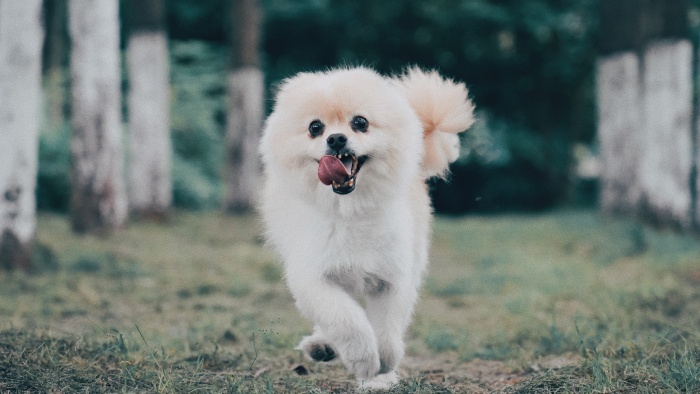Pomeranian Life Span And Health:Comprehensive Care

Considering a Pomeranian life span for a spunky, active small dog that is simply adorable? There are numerous options, but the unique Pomeranian stands out significantly.
This small-breed dog gets its name from Pomerania, a region in northeastern Europe now part of western Germany and Poland. As the smallest of the spitz breeds, they rose to fame after England’s Queen Victoria adored these tiny dogs. Their popularity has since spread worldwide.
When adopting a Pomeranian, it’s important to consider various factors, including their lifespan. So, how long do Pomeranians typically live?
We’ll explore the average lifespan of a Pom, common health issues they face, and ways to ensure your petite companion enjoys as many joyful, healthy years as possible with you.
What is the typical Pomeranian lifespan?
The American Kennel Club (AKC) reports that Pomeranians usually live between 12 to 16 years. This lifespan is quite common for dogs of their size, comparable to other small breeds like the Maltese and toy poodle. It’s important to note that small toy breeds generally outlive larger dog breeds.

There are various factors that can influence the life expectancy of a Pomeranian, potentially leading to longer or shorter lifespans. Like all dog breeds, Pomeranians are susceptible to certain health conditions that potential owners should be aware of.
Typical health concerns in Pomeranians
Pomeranians generally live between 12 and 16 years, yet certain health challenges specific to this breed can reduce this timeframe. Key health issues in Pomeranians include:

Injuries
As reported by The New York Times, injuries are a major cause of mortality in many toy breeds, including Pomeranians. Their diminutive size makes them particularly vulnerable to accidents like being stepped on, falling, or being struck by vehicles. These incidents can be especially harmful to a Pomeranian puppy. To ensure their Pom enjoys a long, healthy life, owners must vigilantly safeguard their physical well-being.
Digestive disorders
Pomeranians are more prone to digestive issues than some other breeds, potentially due to genetic factors. Problems such as inflammatory bowel disease, pancreatitis, and exocrine pancreatic insufficiency are common. Regular veterinary check-ups are crucial for early detection of these conditions before they become critical.
Tracheal collapse
While not usually life-shortening, tracheal collapse is a concern for Pomeranian owners. This condition arises when the cartilage supporting the Pom’s airway weakens, leading to a constricted trachea. Symptoms include a distinct honking or coughing sound as they struggle to breathe.
Typically, the trachea naturally reopens, resolving the issue momentarily. However, in severe cases, surgery might be necessary to maintain an open airway. To avoid exacerbating the issue, many owners opt for a harness instead of a collar when walking their Pomeranian.
Kneecap dislocation
Toy breeds, such as Yorkshire terriers, Chihuahuas, and Pomeranians, are more susceptible to patellar luxation. This condition involves the dislocation of the kneecap from its normal position, potentially affecting one or both hind legs. Signs include intermittent limping, abnormal leg posture, and a “skipping” gait.
Often, the kneecap realigns on its own, but frequent occurrences causing pain may necessitate surgical intervention. Physical therapy and medications can also be beneficial.
Hypothyroidism
Pomeranians have a higher tendency towards hypothyroidism, characterized by a sluggish thyroid gland. This leads to slowed metabolism, manifesting in weight gain, fatigue, excessive hair loss, skin and ear infections, among other symptoms.
While it’s an incurable condition, proper management doesn’t have to shorten a Pomeranian’s life. Treatment involves administering thyroid hormone replacements and regular veterinary visits to monitor their health.
How to properly care for your Pomeranian
Understanding the health risks listed earlier can be daunting. However, by following some straightforward guidelines, you can greatly enhance your Pomeranian’s lifespan. As previously discussed, monitor your dog closely to prevent accidents, use a harness instead of a leash and collar to reduce the risk of tracheal collapse, and consult your vet for conditions like patellar luxation or hypothyroidism.
Here are additional care tips to help your Pomeranian live a long and joyful life:

Select a responsible breeder
Many health issues like gastrointestinal problems, patellar luxation, and hypothyroidism are genetically linked. Therefore, choosing a Pomeranian from a trustworthy breeder is crucial. Good breeders will understand the breed’s health predispositions and avoid breeding dogs with known genetic health issues.
Provide nutritious food
Proper nutrition is essential for your Pomeranian’s health and longevity. Opt for a balanced diet that includes proteins, carbohydrates, healthy fats, vitamins, and minerals. If uncertain, seek your veterinarian’s advice for the best food choice.
Additionally, consider supplementing your dog’s diet with products that support overall health and may alleviate common gastrointestinal issues in Pomeranians.
Regular exercise
Even though Pomeranians are a toy breed, they still require consistent exercise. Regular physical activity is vital for maintaining healthy joints and muscles and preventing obesity. Ensure your Pom gets daily walks and engages in playtime, whether in your backyard or indoors.
Emphasize Preventative Healthcare
Preventative care is key to avoiding numerous health problems:
- Vaccinations: Keep your Pomeranian up-to-date with their vaccinations to prevent various diseases.
- Pest Control: Use monthly treatments to protect against fleas, ticks, and worms.
- Dental Maintenance: Regularly brush your dog’s teeth and check their gums to ensure good oral health.
- Regular Vet Checkups: Consistent veterinary visits are essential for monitoring your Pom’s health and identifying any problems early on.
Mental health and socialization for your pomeranian
Besides the physical care aspects, ensuring your Pomeranian’s mental health is equally important. Mental well-being in dogs, much like in humans, plays a crucial role in their overall health and longevity. Here are some ways to ensure your Pomeranian’s mental health and social needs are met:
Social interaction
Regular socialization is vital for your Pomeranian’s mental health. This can include playdates with other dogs, visits to dog-friendly parks, or simply allowing them to interact with different people. Socialization helps in preventing anxiety and fearfulness, contributing to a more balanced and happy temperament.
Intellectual stimulation
Pomeranians, known for their intelligence and curiosity, thrive on mental challenges. Engage them with interactive toys, puzzles, and games that stimulate their mind. This not only keeps them entertained but also helps prevent boredom and associated destructive behaviors.
Positive reinforcement training
Implementing positive reinforcement training techniques is key in nurturing your Pomeranian’s mental health. This involves rewarding good behavior with treats, praise, or play, which encourages them to repeat those behaviors. It’s an effective way to teach them new skills and improve their overall behavior, while also strengthening your bond with them.
Routine and consistency
Dogs generally respond well to a consistent routine. Having a regular schedule for feeding, walks, playtime, and rest can provide a sense of security and stability for your Pomeranian. A stable routine helps in reducing stress and anxiety, promoting a calm and relaxed demeanor.
Affection and attention
Finally, never underestimate the power of affection and attention. Regular cuddles, petting, and one-on-one time with your Pomeranian can greatly enhance their emotional well-being. These moments of connection reinforce their sense of belonging and can significantly uplift their spirits.
Conclusion
Pomeranian life span, ranging typically from 12 to 16 years, can be significantly influenced by how they are cared for. Ensuring the health and happiness of your Pomeranian involves a combination of physical care, mental stimulation, and emotional support.
From selecting a responsible breeder and providing a nutritious diet to engaging in regular exercise and preventive healthcare, each aspect plays a vital role in extending your Pom’s lifespan. Additionally, prioritizing their mental health through socialization, intellectual stimulation, positive reinforcement training, and a consistent routine contributes greatly to their overall well-being.
Remember, the quality of care and love you provide for your Pomeranian is just as important as the quantity of years you spend together. By following these guidelines, you can help ensure that every year is as joyful and healthy as possible for your beloved companion.

